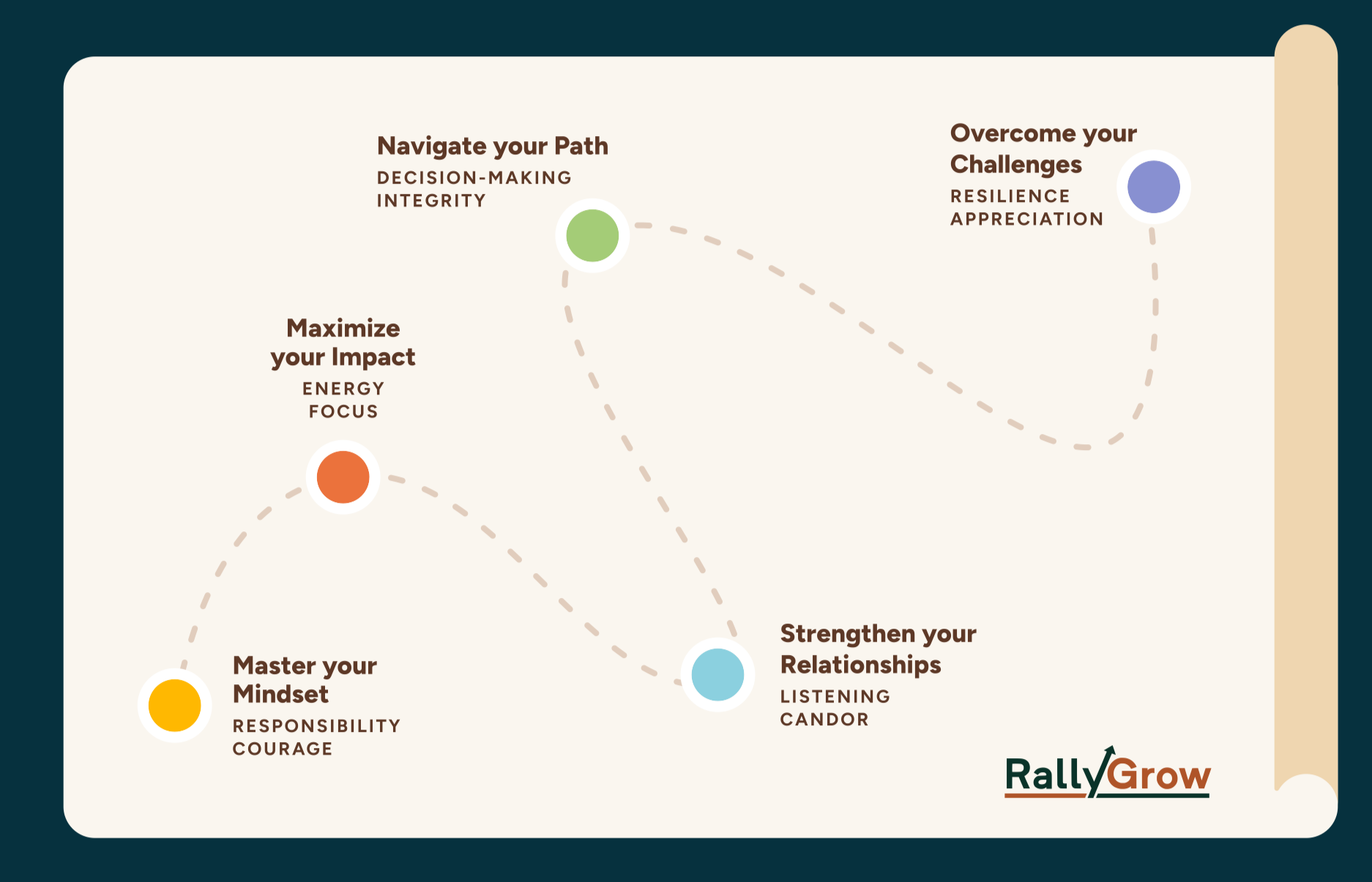RallyGrow Series | Skill #1: Responsibility
This post is part of our RallyGrow series, covering 10 human skills that drive real impact in life and work.

The first RallyGrow course is called Mastering Your Mindset, which covers two human skills of Responsibility and Courage.
Today we’re going deep on Responsibility and sharing some frameworks, resources, and learnings to help you think about what responsibility is and means to you and how it shows up and shapes your actions and decisions across work and life. Our goal is that you’ll uncover beliefs that may be holding you back, empowering yourself to embrace a mindset that supports your goals and growth.
Let’s start with a definition
Oxford Languages cites Responsibility as “the state or fact of having a duty to deal with something or of having control over someone.” or “the state or fact of being accountable or to blame for something.”
Our working definition is “Owning your mindset, actions, and outcomes”.
These dovetail nicely with the teachings of The Conscious Leadership Group (CLG). We are big fans of CLG at Rallyday and many of the concepts they teach. Let’s dive in.
100% Responsibility
This Framework, introduced by Jack Canfield in The Success Principles, can be incredibly powerful when taking responsibility. It emphasizes taking complete ownership (not 50%, and not over 100%) of your circumstances and outcomes. While easy to blame outcomes on bad luck, the universe, or others, the framework encourages you to pause and ask:
- “What role did I play in this?” and
- “How can I ensure a better outcome next time?”
Taking exactly 100% responsibility means factoring in your part to the equation, not more and not less. Taking less than 100% responsibility means you are likely blaming “other” people or factors and feel powerless to change your situation. While taking more than 100% responsibility, you’ll likely be taking ownership of situations well beyond your control or fault.
Above the Line and Below the Line
Taught by the Conscious Leadership Group, this tool helps us recognize when we are adopting a mindset of growth and ownership versus when we are trapped in a defensive, reactive mode.
- Above the line thinking focuses on ownership and a willingness to learn. It’s about acknowledging our role in situations and seeing challenges as opportunities to grow. Above the line behaviors encourage curiosity, learning, and action instead of reaction.
- Below the line thinking occurs when we are defensive, closed off, or focused on protecting our ego. This mentality leads to behaviors like blaming others, denying responsibility, or making excuses.
While it’s noble to aspire to always be “above the line”, it’s not practical as we’re all human and have emotions on both sides. The power of this tool is not to be hard on yourself for being below the line but to bring awareness of where you are at, why, and if or how you seek to change your mindset around it.
Drama Triangle - Victim, Hero, Villain
The Drama Triangle concept, first described in the 1960s by therapist Stephen Karpman describes three primary roles that we play when we are below the line.
The Drama Triangle describes three reactive roles we fall into when we are triggered: Victim, Villain, and Hero.
Once exposed to this concept, you might catch yourself (or others) falling neatly into these roles when telling a story and often times even jumping back and forth between these personas in the same breath.
Unconscious Commitments
These are mindsets that drive our actions without us realizing it.
Consider how often you’ve made a commitment to yourself or someone else — like getting up early, making plans to do something, or finishing a project by a certain time — only to fall short. You might tell yourself you’re committed to these goals, but your behaviors reveal something else. This disconnect occurs because of unconscious commitments - mindsets that drive our actions without us realizing it.
We invite you to explore these concepts more deeply through the resources below.
Quick Hits
Short reads, videos, and podcasts to get inspired and start applying right away.
- Watch (~5min) or read about this 100% Responsibility framework
- Watch or Read more on "Locating Yourself" either Above the Line or Below the Line
- Watch (~3-min) or Read more about the Drama Triangle concept
Deeper Dives
Books and long-form content for when you want to go further into the ideas and practices.
- Read The 15 Commitments of Conscious Leadership: A New Paradigm for Sustainable Success book to learn more about Above/Below the Line, The Drama Triangle, and more.
- Additionally, check out https://conscious.is/ site and materials
- Read Carol Dweck’s Mindset: The New Psychology of Success Book
- More on 100% Responsibility from Jack Canfield’s *The Success Principles: How to Get from Where You Are to Where You Want to Be* book
Next up, we’ll be talking about Courage!
Interested in learning more or exploring RallyGrow? Email rallygrow@rallydaypartners.com to inquire and request access.
 BACK TO Thought Leadership
BACK TO Thought Leadership